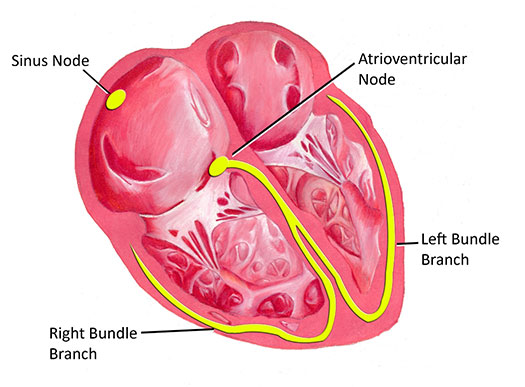AV Node
The AV node is a cluster of specialized electrical cells positioned right near the middle of the heart. It is responsible for conducting electrical impulses from the top 2 chambers of the heart, the right and left atria, to the bottom 2 chambers of the heart, the right and left ventricles. Typically it is the only pathway electricity can travel to get from the top to the bottom of the heart.
Fortunately primary disorders of the AV node are uncommon in children. The most common problem associated with the AV node is called AV block. AV block refers to any form of impaired transfer of electricity through the AV node. This includes slower than normal transfer of electricity (first degree AV block), as well as completely impaired transfer of electricity (third-degree or complete AV block), as well as everything in between.
In many instances first degree AV block and certain types of second-degree AV block can be normal variants found in perfectly healthy individuals. Third degree AV block, or complete AV block (complete heart block), is always abnormal. In pediatric patients it is usually seen in one of 2 situations. It can be seen following surgery for congenital heart defects. Occasionally the AV node may be directly injured, or inflammation or swelling of the heart muscle may damage the AV node. This can result in permanent dysfunction and complete AV block. Complete AV block is also seen as a congenital abnormality that develops in the womb. This is usually found in a fetus whose mother has some form of connective tissue disease, for example systemic lupus erythematosus (SLE). In this setting, antibodies from the mother cross the placenta into the developing fetus and attack the AV node, causing irreversible damage.

Evaluation of the AV node usually takes the form of either an ECG or a more prolonged study of the electrical system of the heart, for example as is found with a 24-hour Holter monitor. Stress testing can also be useful in evaluating the function of the AV node.
Treatment of AV node disorders varies depending on the severity of the disorder. Most children with complete AV block require a permanent pacemaker. Incomplete forms of AV block may not require any treatment at all.
